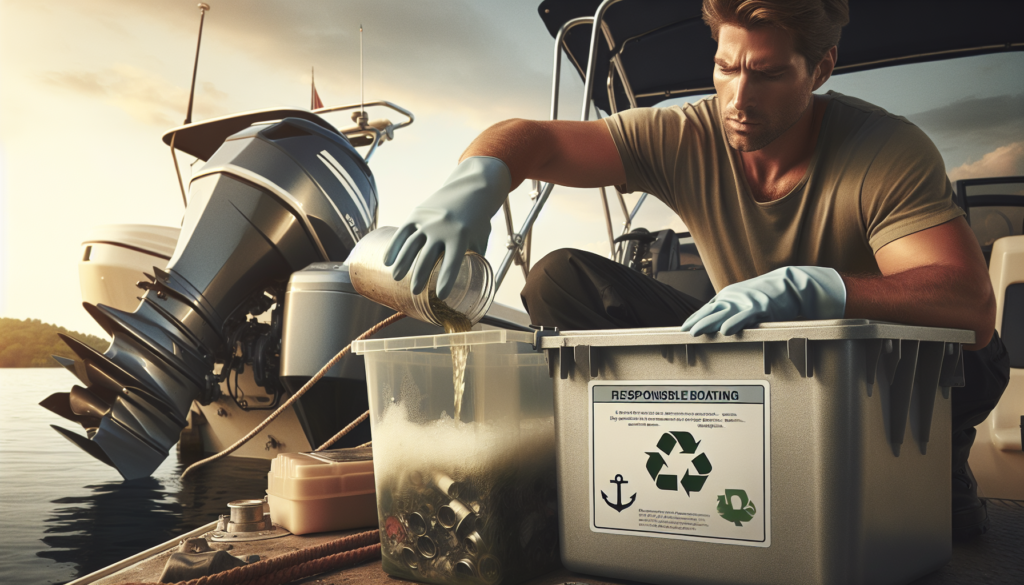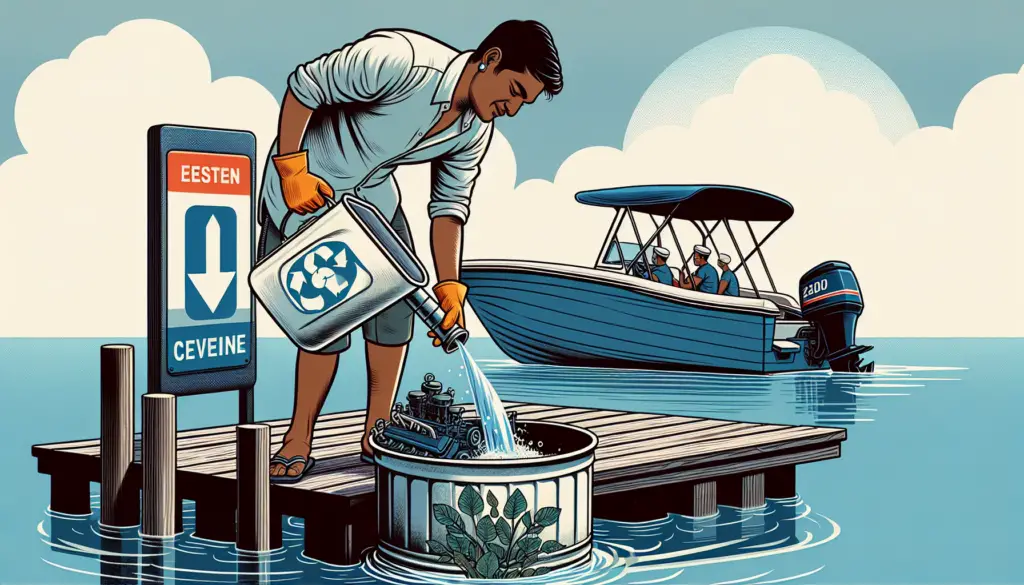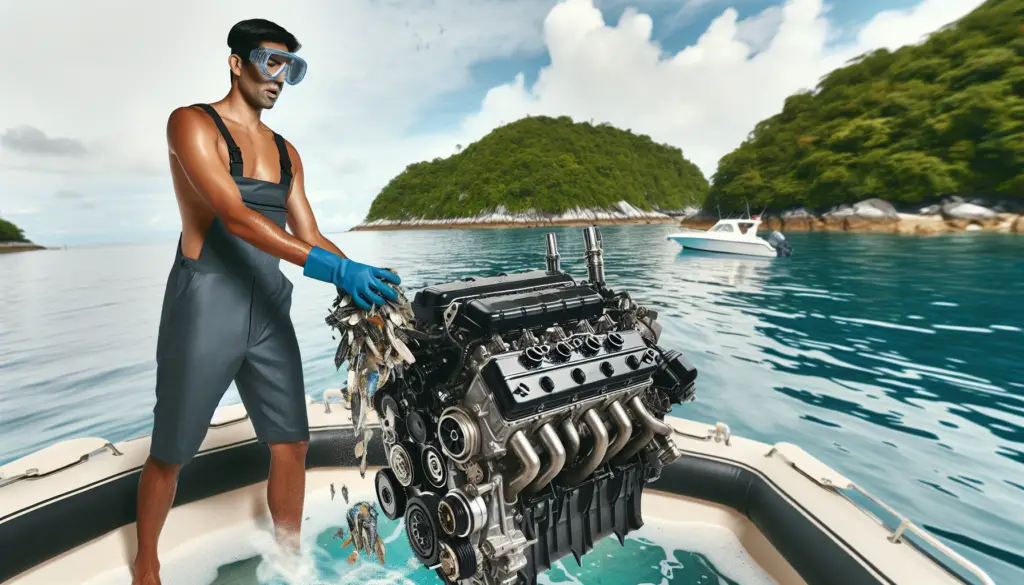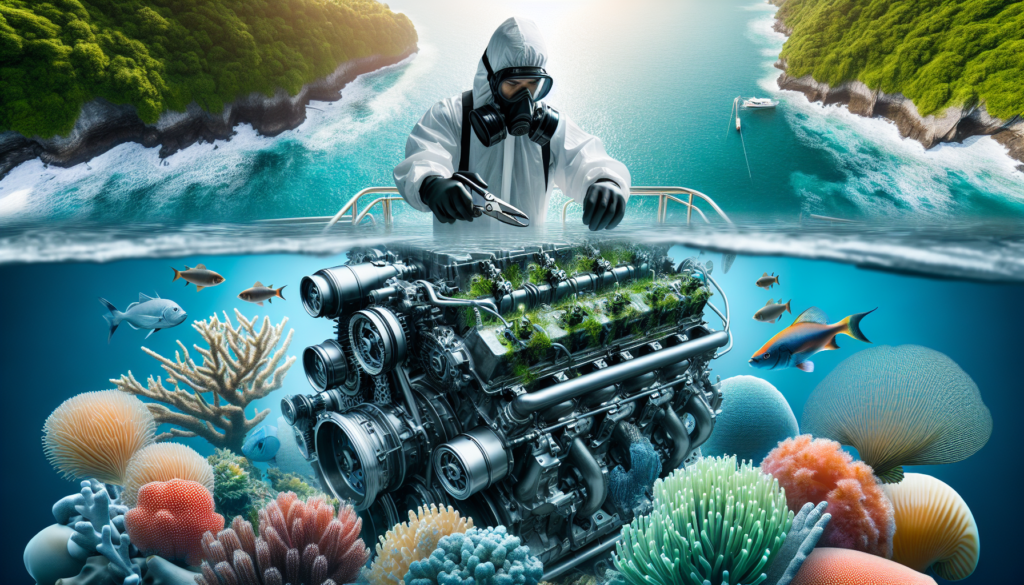Imagine a beautiful day out on the water, the sun shining and not a care in the world. Suddenly, technical issues arise with your boat, spoiling your perfect day. “How To Properly Dispose Of Boat Engine Waste” is your comprehensive guide to handling these situations. This article acts as an invaluable resource to boat owners, outlining the best practices and procedures for safely getting rid of boat engine waste. You’ll be equipped with the knowledge to ensure that your seafaring adventures are always smooth sailing by minimising any harm to the environment.

Understanding Boat Engine Waste
When you’re out on the open water, the last thing you may be thinking about is the waste your boat’s engine is producing. However, it’s an essential aspect to consider for both the longevity of your boat and the health of the marine environment.
Defining boat engine waste
Boat engine waste refers to the byproducts produced during the operation and maintenance of your vessel’s engine. This can include used motor oil, antifreeze, used filters, lubricants, and even fuel products that can no longer be used. These waste products are often toxic and can pose serious threats to the marine environment if they are not handled appropriately.
Types of waste produced by boat engines
There are several types of waste that a boat engine can produce. The most common are used motor oil, old filters, antifreeze, and fuel-based wastes. There are also waste products that result from the boat cleaning process, which can include everything from soaps and waxes to cleaning solvents.
Impact of this waste on the environment
If not properly disposed of, boat engine waste can have detrimental effects on marine ecosystems. Used oils and fuels can contaminate waterways, endangering aquatic life and impacting water quality. Waste from boat cleaning products can introduce harmful chemicals to the environment, while improperly discarded filters can litter bodies of water and pose a risk to marine life.
Waste Prevention Measures
Preventing waste in the first place is a crucial step towards maintaining a green boating practice. There are several steps you can take to minimize the waste produced by your boat’s engine.
Maintenance routines for lesser waste
Regular maintenance of your boat engine can significantly reduce the amount of waste produced. This includes changing your oil and filters as needed, maintaining proper engine tuning, and keeping your engine clean to prevent oil leaks and spills.
Use of eco-friendly boat products
By switching to eco-friendly boat products, you can drastically cut down on the harmful waste your engine produces. Look for environmentally-friendly engine oils and cleaning products, which are typically biodegradable and free of harmful chemicals.
Proper usage of boat engine to minimize waste
Overuse, speeding, and engine idling can all lead to excessive fuel consumption and waste. Instead, operate your boat at a moderate speed and reduce engine idling to help minimize waste.

Storage of the Boat Engine Waste
Properly storing boat engine waste is crucial to prevent spills and leaks that could harm the environment.
Tools needed for boat engine waste storage
Containers with secure lids are essential for storing waste such as used oil, antifreeze, and filters. Always make sure containers are clearly labeled, clean, and dry before use. Funnels can be used to avoid spills during transfer.
Safety measures during storage
Safety is a priority when storing engine waste. Always store waste in a cool, dry place away from children and pets. Avoid storing next to heat sources or flammable materials to prevent fires.
Appropriate conditions for waste storage
Boat engine waste should never be stored on the ground or in places where it could be knocked over. Ensure the storage area is stable and not at risk of flooding or other environmental hazards.
Methods of Disposal for Used Oil
Proper disposal of used oil from your boat engine is crucial not only for the environment but also for complying with legal regulations.
Locating nearby recycling facilities
Typically, used oil can be recycled. Many areas have recycling facilities or auto shops that accept used motor oil. Check with local waste disposal or recycling centers for information.
How to prepare used oil for disposal or recycling
Ensure used oil is stored in clean, plastic containers with tight-fitting lids. Do not mix different types of wastes – keep used oil separate from antifreeze, solvents, etc.
Transport safety for used oil
When taking used oil to a recycling facility, secure containers in your vehicle to prevent spills. If a spill does occur, contact local authorities for guidance on cleanup.

Disposal of Antifreeze
Like oil, antifreeze is a significant component of boat engine waste that requires proper disposal.
Understanding Antifreeze and its impact
Antifreeze, used in boat engines to prevent overheating, contains ethylene glycol, which is highly toxic to humans and animals. When improperly disposed of, antifreeze can contaminate water and soil.
Preparation of Antifreeze for disposal
Antifreeze should be stored separately from other engine wastes. As with oil, use a clean, plastic container with a secure lid for storage.
Disposal facilities that accept used antifreeze
Many recycling centers and auto shops will accept used antifreeze for recycling. Remember, it’s illegal to dispose of antifreeze in storm drains, bodies of water, or on the ground.
Disposal of Used Filters
Used filters from your boat engine can also pose environmental threats if not properly disposed of.
Importance of proper filter disposal
Filters are used in boat engines to remove impurities from oil and fuel. These filters can become saturated with harmful substances and must be disposed of properly.
Preparing used filters for disposal
Used filters should be drained of excess oil or fuel before disposal. Most recycling centers accept used filters, but they must typically be clean and dry.
Disposal methods for used filters
Used filters can be recycled or disposed of at a hazardous waste facility. It’s illegal to throw used filters in the regular trash due to their potentially harmful contents.

Dealing with Fuel and Fuel-Based Wastes
Fuel and fuel-based wastes can be particularly harmful to the environment if not properly managed and disposed of.
Dangers of improper fuel waste disposal
Incorrect disposal of fuel waste can lead to soil and water contamination. It can also emit harmful fumes, posing risks to air quality and public health.
Methods of safe fuel waste disposal
Fuel waste should be stored in approved containers and brought to a hazardous waste facility for proper disposal. This includes any rags, filters, or other materials contaminated with fuel.
Recycling options for waste fuel
Some facilities may accept waste fuel for recycling. This not only ensures proper disposal but also reduces waste by reusing resources.
Boat Cleaning Waste Management
Cleanliness is next to green-ness when it comes to boat maintenance. However, it’s crucial to dispose of cleaning waste responsibly.
Importance of non-toxic cleaning products
Many boat cleaning products contain chemicals that can harm aquatic life and water quality. Opt for non-toxic, biodegradable cleaning products to reduce environmental impact.
Disposal of cleaning waste products
All cleaning waste, whether liquid or solid, should be disposed of properly to prevent environmental harm. Never dump cleaning waste into bodies of water or storm drains.
Choosing eco-friendly boat cleaning methods
Consider alternative, eco-friendly methods for boat cleaning such as waterless wash products or using a professional eco-friendly boat cleaning service.
Legal Regulations on Boat Waste Disposal
Proper disposal of boat engine waste isn’t just environmentally responsible – it’s also legally required in many areas.
Understanding the local regulations
Local regulations on boat waste disposal can vary, so it’s important to familiarize yourself with the laws in your area. This may involve contacting local waste management agencies or doing some online research.
Federal and international guidelines for boat waste disposal
There are also federal and international guidelines that govern boat waste disposal. For example, the Clean Water Act in the United States provides regulations on the disposal of oil and other hazardous substances.
Penalties for non-compliance with regulations
Failing to comply with regulations can result in significant penalties, including fines and even imprisonment. It’s important to understand and adhere to these regulations to avoid potential legal trouble.
Promoting Environmentally Responsible Boating
Being an environmentally responsible boater isn’t just about managing your own waste. It’s also about promoting green practices in the boating community.
Educating other boaters on waste disposal
Sharing your knowledge with fellow boaters can help spread good practices. Discuss safe disposal methods and eco-friendly products to make a larger impact.
Engaging in clean boating campaigns
Participating in or organizing clean boating campaigns can help raise awareness and make a difference in your local boating community.
Benefits of adopting green boating practices
Adopting green boating practices not only protects the marine environment but also helps extend the life of your boat and can reduce costs in the long run. Plus, it feels good to know you’re doing your part to protect our precious waterways. Keep it clean and happy boating!


[…] the waste from your boat’s engine? In the pursuit of keeping our waters clean, the article “How To Properly Dispose Of Boat Engine Waste” provides reliable tips and procedures to rid of such waste correctly and responsibly. This […]